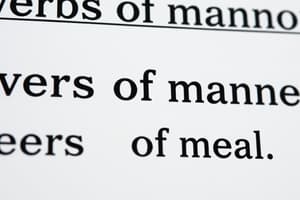Podcast
Questions and Answers
Adverbs of manner describe how an action is performed.
Adverbs of manner describe how an action is performed.
True (A)
Adverbs of manner are always formed by adding '-est' to adjectives.
Adverbs of manner are always formed by adding '-est' to adjectives.
False (B)
Good is an example of an adverb of manner.
Good is an example of an adverb of manner.
False (B)
Examples of adverbs of manner include quickly, carefully, and loudly.
Examples of adverbs of manner include quickly, carefully, and loudly.
Adverbs of manner can also appear before the verb for emphasis.
Adverbs of manner can also appear before the verb for emphasis.
Adverbs of manner are different from adverbs of degree, like very.
Adverbs of manner are different from adverbs of degree, like very.
The sentence 'She spoke in a loud manner' is preferred over 'She spoke loudly'.
The sentence 'She spoke in a loud manner' is preferred over 'She spoke loudly'.
Adverbs of manner can enhance the reader's understanding of the action being described.
Adverbs of manner can enhance the reader's understanding of the action being described.
The present simple tense can be used to describe permanent states.
The present simple tense can be used to describe permanent states.
The present simple is unsuitable for expressing habitual actions.
The present simple is unsuitable for expressing habitual actions.
Universal truths can be stated using the present simple tense.
Universal truths can be stated using the present simple tense.
Scheduled events cannot be indicated using the present simple tense.
Scheduled events cannot be indicated using the present simple tense.
Instructions and directions can be given in the present simple tense.
Instructions and directions can be given in the present simple tense.
The present simple tense is not used for narrating events in real-time.
The present simple tense is not used for narrating events in real-time.
The affirmative structure of the present simple for third person singular requires adding -es.
The affirmative structure of the present simple for third person singular requires adding -es.
The negative structure of the present simple includes the word 'not'.
The negative structure of the present simple includes the word 'not'.
Time expressions like 'every day' are often used with the present simple tense.
Time expressions like 'every day' are often used with the present simple tense.
The present simple tense cannot use the base form of the verb in questions.
The present simple tense cannot use the base form of the verb in questions.
Flashcards are hidden until you start studying
Study Notes
Adverbs of Manner
-
Definition: Adverbs of manner describe how an action is performed. They provide information about the way, style, or method of the action.
-
Formation:
- Often formed by adding "-ly" to adjectives (e.g., quick → quickly, happy → happily).
- Some adverbs of manner are irregular (e.g., good → well).
-
Examples:
- Quickly: She runs quickly.
- Carefully: He drives carefully.
- Loudly: They laughed loudly.
- Eagerly: She accepted the invitation eagerly.
-
Placement in Sentences:
- Typically placed after the main verb or at the end of a sentence (e.g., She sings beautifully).
- Can also appear before the verb, especially for emphasis (e.g., Quickly, he finished his homework).
-
Common Adverbs of Manner:
- Smoothly
- Gently
- Gratefully
- Brightly
- Angrily
-
Usage Notes:
- Help clarify the action being described, enhancing the reader's understanding.
- Avoid redundancy with other descriptive words (e.g., "She spoke loudly" is clear; "She spoke in a loud manner" is more cumbersome).
-
Comparison with Other Adverb Types:
- Different from adverbs of time (e.g., soon), place (e.g., here), degree (e.g., very), and frequency (e.g., always).
-
Practice:
- Identify adverbs of manner in sentences and practice converting adjectives to adverbs by adding "-ly".
Adverbs of Manner
- Describe how an action is performed, offering insight into the way, style, or method of the action.
- Typically formed by adding "-ly" to adjectives (e.g., quick → quickly; happy → happily).
- Some adverbs are irregular, such as "good" becoming "well".
Examples of Adverbs of Manner
- Quickly: She runs quickly.
- Carefully: He drives carefully.
- Loudly: They laughed loudly.
- Eagerly: She accepted the invitation eagerly.
Sentence Placement
- Usually positioned after the main verb or at the end of a sentence (e.g., She sings beautifully).
- Can precede the verb for emphasis (e.g., Quickly, he finished his homework).
Common Adverbs of Manner
- Smoothly
- Gently
- Gratefully
- Brightly
- Angrily
Usage Notes
- Enhance clarity about the action, improving reader comprehension.
- Avoid redundancy with other descriptors; for example, "She spoke loudly" is succinct compared to "She spoke in a loud manner."
Comparison with Other Adverb Types
- Distinct from adverbs of:
- Time (e.g., soon)
- Place (e.g., here)
- Degree (e.g., very)
- Frequency (e.g., always)
Practice Suggestions
- Identify adverbs of manner within sentences.
- Convert adjectives to adverbs by adding "-ly" for practice.
General Description
- Present simple tense describes habits, routines, and facts.
When to Use
- Habitual Actions: Expresses actions occurring regularly or repeatedly; example: "She drinks coffee every morning."
- Permanent States: Indicates states or conditions that are generally true; example: "He lives in New York."
- Universal Truths: States universally true facts or scientific facts; example: "The Earth revolves around the Sun."
- Scheduled Events: Refers to future events that are scheduled or timetabled; example: "The train departs at 6 PM."
- Instructions and Directions: Used to give clear instructions or directions; example: "First, turn left at the traffic light."
- Commentaries: Narrates events in real-time, often used in sports commentary; example: "He kicks the ball and scores!"
Forming the Present Simple
- Affirmative Structure: Follows the formula: Subject + base form of the verb (add -s or -es for third person singular); example: "I play," "He plays."
- Negative Structure: Constructed with: Subject + do/does not + base form of the verb; example: "I do not like," "She does not play."
- Interrogative Structure: Formulated as: Do/Does + subject + base form of the verb?; example: "Do you read?" "Does he play?"
Spelling Rules
- For most verbs, add -s (e.g., "He works").
- For verbs ending in -s, -sh, -ch, -x, or -o, add -es (e.g., "She watches").
- Change the final y to -ies for verbs ending in a consonant + y (e.g., "He carries").
Common Time Expressions
- Common expressions include: always, often, usually, sometimes, rarely, never.
- Additional expressions: every day, on Mondays, once a week, etc.
Studying That Suits You
Use AI to generate personalized quizzes and flashcards to suit your learning preferences.




